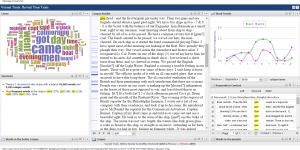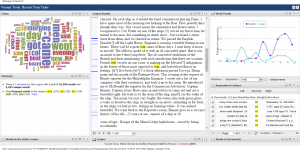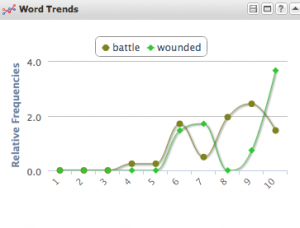Thinking through the hypothesis, the first words I decided to take a look at were “guns” and “arms.” My initial thought was that maybe the usage of these terms would change as Linn went in and out of battle, either in frequency or in connotation. A pattern did show up while looking at the trend chart, though it wasn’t what I was expecting to find. While the frequency of these terms did increase once he got to the battlefront, there was no real change in his tone after the first battle was over. These words didn’t really help me answer this question, so I decided to move on to a new search term.
I decided that if the instruments of war weren’t going to give me my answer, I would have to take a step back. I used the word trends graph to give me a comparison between the uses of the words “war” and “battle.” It was this search that gave me my more interesting results. Most of the 15 uses of the word “war” happened in the first half of the diary, while he was in Maryland before departing and while aboard the Cossack. There is a long break where “war” does not appear once the first battle has started until after it had ended, where the gap was broken by the simple sentence “War is horrible.” This very much seemed to prove Professor Jakacki’s hypothesis, at least in part. Linn did not have such a negative view of war before that point, something had changed in his perception. After that revealing search, I added a map of “battle” to my graph. This revealed an entirely different trend. The two words, “battle” and “war,” seemed to show up somewhat exclusive of each other; their frequencies were inversely related.
This made me ask another question: Why are these two topics discussed exclusively of each other? Was Linn unable to see the bigger picture of the war in the heat of battle? Was he not imagining the battles that lay ahead when he was on campaign? These are questions that I could seek to answer in the future.



